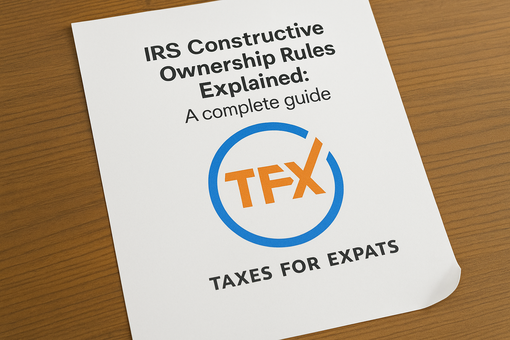Tax guide for Americans in Japan

Moving to Japan offers a unique blend of opportunity and adventure, but one area that often surprises American expatriates is the complexity of Japanese taxes. From income tax to social security contributions, understanding how the Japanese tax system works is essential for anyone living or working in the country.
This guide breaks down what US expats need to know about Japanese taxes, including how residency status affects your tax obligations and what steps you can take to stay compliant with both Japanese and US tax laws. Whether you're just settling in or have been in Japan for years, getting a clear picture of your tax responsibilities is key to protecting your finances abroad.
This article is brought to you by Taxes for Expats (TFX) – a top-rated tax firm serving US citizens, residents, and anyone with US tax obligations, both at home and abroad. Living in Japan and need help with your US taxes? Schedule your free discovery call, and we’ll review your case and walk you through the next steps.
Overview of Japan
| Primary tax form for residents | Japanese individual tax return (Kakutei Shinkoku). |
| Tax year | January 1 – December 31 |
| Tax due date | March 15 |
| Criteria for tax residency | Reside in Japan for more than 183 days per year. |
| US tax filing requirements | Must file Form 1040 and report worldwide income. |
| Eligibility for FEIE | Qualify under the physical presence or bona fide residence test. |
| Methods of Double Tax Relief | Available through the US-Japan tax treaty and foreign tax credits. |
| Tax residency for dual citizens | Taxed by both countries, but the treaty helps avoid double taxation. |
| Estate and inheritance tax | Japan has an inheritance tax; the US estate tax may also apply. |
| Overview of local tax rates | Progressive rates up to 45% plus local taxes. |
Japanese tax residency
When it comes to paying taxes in Japan, your residency status matters.
Japan divides people into three categories:
-
Non-resident
Just moved here? Haven't been here a full year? You're probably a nonresident. This means that Japan will only tax you on money you earn in Japan. -
Non-permanent resident
Lived in Japan for less than five of the last ten years and don't have Japanese citizenship? That's you. You'll pay tax on income from Japan and some foreign income - if it's brought into Japan or paid here. -
Permanent resident
If you've been here five out of the last ten years, you're in this group. Whether you're a Japanese citizen or not, Japan will tax your worldwide income - just like the US does.
If you're a US citizen or green card holder, you must file and pay US taxes, even if you're already a tax resident of Japan.

Types of taxation in Japan
Japan has a comprehensive tax system that affects both residents and non-residents. Here are the key types of taxes you should be aware of.
Personal Japan income tax rate
Japan's income tax is progressive, meaning the rate increases as your income increases. Tax rates range from 5% to 45%.
The tax rate for 2025 is:
| Taxable income (JPY*) | Tax rate (%) |
| 0-1,950,000 | 5 |
| 1,950,000-3,300,000 | 10 |
| 3,300,000-6,950,000 | 20 |
| 6,950,000-9,000,000 | 23 |
| 9,000,000-18,000,000 | 33 |
| 18,000,000-40,000,000 | 40 |
| 40,000,000 and above | 45 |
* Japanese yen
Local income tax
In addition to national income tax, you'll also pay local income tax in Japan - often called resident tax. It's levied by both your prefecture and your municipality.
Here's what you need to know:
- It's based on last year's income, not your current income.
- The total rate is usually around 10% of your taxable income.
Surtax
On top of the regular income tax, Japan adds a small extra charge - a 2.1% surtax. It's basically a tax on top of your income tax.
Here's how it works:
- First, you calculate your income tax using Japan's standard tax brackets.
- Then you add 2.1% to that total as a surtax.
Example:
Let's say your income tax is 1,000,000 JPY.
You'd owe an extra 21,000 JPY as surtax, bringing your total tax bill to 1,021,000 JPY.
Japan property tax
If you own real estate in Japan, you'll need to pay property tax, known as fixed asset tax.
Here’s the key info:
- It’s an annual tax on land and buildings.
- The standard rate is 1.4% of the assessed value, though some areas may charge slightly more.
- Property owners also pay a separate city planning tax (usually 0.3%) if the property is in designated urban zones.
Japan consumption tax
Japan levies a consumption tax on most goods and services - similar to the VAT or GST in other countries.
A few key points:
- It's a national tax that's included in the price you see in stores or on receipts.
- Because it's already built into prices, you may not notice it - but it's there.
- The standard rate is 10%, but some essentials like food, newspapers, and public transport are taxed at a lower rate of 8% to ease the burden on consumers.
So, while you don't usually see it broken out, this tax affects almost everything you buy in Japan.
Inheritance tax rates
Japan's inheritance tax applies to assets passed on after someone's death - and it can be substantial.
- The tax is calculated based on the total value of the inherited assets.
- Rates are progressive, ranging from 10% to 55%-the more you inherit, the higher the rate.
Your relationship to the deceased also matters. Close family members often face lower effective tax rates, while more distant relatives or unrelated heirs may pay more.
| Taxable property less exemptions (JPY) | Tax rate (%) |
| 0-10,000,000 | 10 |
| 10,000,000-30,000,000 | 15 |
| 30,000,000-50,000,000 | 20 |
| 50,000,000-100,000,000 | 30 |
| 100,000,000-200,000,000 | 40 |
| 200,000,000-300,000,000 | 45 |
| 300,000,000-600,000,000 | 50 |
| 600,000,000 and above | 55 |
There are also special deductions based on family relationships that can significantly reduce the estate tax liability.
Capital gains tax
If you sell assets such as real estate or stocks in Japan and make a profit, you may be subject to capital gains tax.
For real estate, the tax rate depends on how long you've owned the property:
- Short-term (held ≤5 years): taxed at 39.63%
- Long-term (held >5 years): taxed at 20.315%
For stocks and other securities, capital gains are taxed at a flat rate of 20.315%.
Foreigners are taxed only on capital gains from assets located in Japan.
Japan Social Security system
Japan has a strong social safety net. It covers health care, retirement, unemployment, and work-related injuries. If you live and work here, even for a short time, you'll probably have to pay into it.
Health Insurance:
- Employee health insurance (健康保険, Kenkō Hoken) - for full-time employees of companies
- National health insurance (国民健康保険, Kokumin Kenkō Hoken) - for freelancers, part-timers, and students. Both cover most of your medical bills. You usually pay about 30% out of pocket.
Pension.
If you're between 20 and 59, you're expected to pay into the state pension (国民年金, Kokumin Nenkin).
If you work for a company, you'll also be covered by an employee pension plan (厚生年金保険, Kōsei Nenkin Hoken).
These programs help when you retire - or if you become disabled or die, they help your family.
Unemployment insurance
Unemployment insurance (雇用保険, Koyō Hoken) can give you financial support while you look for work.
If you're employed by a company, you're probably already covered.
Workers' compensation
Workers' compensation (労働者災害補償保険, Rōdōsha Saigai Hoshō Hoken) covers treatment and lost wages.
It applies to all employees, no matter what your job.
The US-Japan tax treaty
Pay taxes in two countries? The US-Japan tax treaty is designed to make it easier and fairer.
-
No double taxation
The treaty sets rules for who taxes what, so you don't pay taxes on the same income in both countries. -
Lower withholding rates
If you receive dividends, interest, or royalties from Japan or the US, the treaty may reduce the amount that is withheld. -
Foreign tax credits
Have you paid taxes in one country on income that is also taxed in the other? You may be eligible for a tax credit to offset the double hit. -
Clear rules for retirement income
It also covers pensions and Social Security, so retirees know what to expect when it comes to taxes on these payments.
Most popular tax forms for US expats
US expatriates living in Japan are required to file US tax returns, and there are several forms that are commonly used:
- Form 1040: The standard US income tax return. If you're a US citizen or green card holder and earn more than the minimum threshold, you'll need to file this.
- Form 2555 (FEIE): This allows you to exclude from US tax up to $130,000 (for 2025) earned abroad if you meet the foreign residency or physical presence rules.
- Form 1116: If you've paid income tax to Japan, Form 1116 helps you avoid being taxed twice on the same income. It allows you to claim a foreign tax credit, which reduces your US tax bill by the amount you paid abroad.
- Form 8938: If you have foreign financial assets - such as foreign bank accounts, investments, or pensions - worth more than $10,000, you must file Form 8938 with your tax return.
- FBAR (FinCEN Form 114): If you had more than $10,000 in total in foreign bank accounts at any time during the year - even for just one day - you are required to file an FBAR.
When are Japanese taxes due?
Japan's tax year follows the calendar - January 1 to December 31.
The deadline for filing your income tax return is March 15 of the following year. If you owe tax, it must be paid by this date to avoid interest and penalties.
Need more time to file?
You can file for an extension. But remember, the due date doesn't change. You still have to pay what you owe by March 15, even if you file later.
Japan tax forms for US expats
As a US expat living in Japan, you'll likely encounter a few local tax forms when filing your Japanese tax return. Here are the most important ones to know:
-
Form B
The form for most residents. It covers all types of income and allows you to claim deductions. Includes separate sections (schedules) for different sources of income. -
Form 16
Used to report earned income and shows any taxes already withheld by your employer. You'll usually get this from your company. -
Form 17
For the self-employed. You'll use this to report your business income and list your expenses. -
Form 22
For reporting capital gains, such as profits from the sale of real estate or stocks. -
Form 23
For reporting rental income from property you own.These forms are key to complying with Japan's tax system - especially if you have multiple sources of income.



